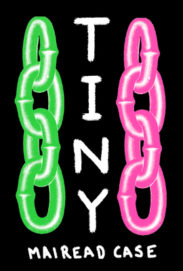 Mairead Case
Mairead Case
Featherproof Books ($14.95)
by Evelyn Hampton
Tiny begins with an epigraph from Donna Haraway: “It matters what stories we tell to tell other stories with. It matters what concepts we think to think other concepts with.” Mairead Case’s novel is described by the publisher as “a contemporary, poetic retelling of Sophocles’s Antigone,” but while that classic is invoked to tell Tiny’s story, Tiny is ultimately less a retelling of Sophocles’s play than it is an exploration of how the story’s motifs—war, grief, and power—play out in a life that insists on exceeding its traditional narrative. As Case tells us, “Tiny’s name comes from Antigone, but also tinsel.” She continues with a list of “the sparkly threads” of sources that inspired her.
Tinsel as a symbol may seem innocuous, but it keeps catching your eye, reminding you of its presence. This is important for Tiny—disappearance and invisibility are real threats because death and grief threaten to swallow what she is able to say. Her mother dies of cancer when Tiny is a toddler, and later her brother, Kelley, commits suicide. The unnamed narrator, who is safe from the trauma that has touched Tiny’s life, is a reliable voice for Tiny’s story—and for its silences. When Tiny stands up to speak at Kelley’s funeral, a gap inserts itself, which Case shows us as empty space on the page and which the narrator doesn’t try to fill.
Tiny spends most of her time with Izzy (her best friend), Hank (her boyfriend), and Bear (her dad). In these scenes we see how there can be closeness and intimacy without a lot of talking. Tiny has a private understanding of the sparkly threads connecting her to the world, and the narrator helps articulate and make these connections visible to us. Tiny collects fragments—“a zirconium stud found in the frozen aisle of Fresh Taste Foods, purple beads from a poet wobbly on mezcal, a hamburger wrapper cold-wiped clean of cheese, and a half-full bottle of lavender oil”—and places them in the altar she’s building in the woods. This is one way Tiny tells her story. Other animals deposit gifts in the altar and Tiny recognizes that they’re part of her story too.
Of course, while the unspoken is given its due by Case, the author is equally attentive to stories’ role in constructing our identities. The narrator tells us that when Tiny and Izzy are together,
They talk about music and hunger, and they tell stories that are shaped long and straight. Stories that end clearly and permanently.
These kinds of stories are comforting because, like the weather, they are okay to talk about with pretty much anyone. They are binary operations that many people have seen or solved. Even if they haven’t, their brains know the patterns. They can relate. The pictures are familiar, even watered-down, and any ambient anxiety is calmed by trust in a resolution.
Tiny, however, is not a long, straight kind of story. It hovers around the ancient story of patriarchy, and while some of what happens to Tiny maps onto what happens to Antigone, Case is not, or not merely, crafting another version of the well-known tragedy. Instead, she is writing about stories, how they operate and how lives move and flow around them, eddying and spreading out in unstorylike shapes. Like the crows that collect detritus from Tiny’s neighborhood and deposit it on her altar, Case has collected moments and episodes from Tiny’s life: Tiny and Izzy dancing at UP IN ARMS, Tiny and Hank lying in bed together, eating an orange. The pieces aren’t shaped to fit perfectly together, and death keeps cutting in, taking what it takes. Tiny has to learn to move around the absences, keep dancing despite them—dancing with them. Instead of tired tropes, we learn to trust Tiny, because Tiny learns to trust herself. As the narrator, who knows so much but who doesn’t insist, tells us near the end, “Tiny wants to call her younger self to say: hey, the crows are still here. They’re looking out.”
